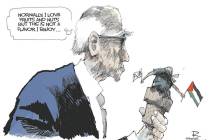Secret justice invites abuse
A woman in the Philadelphia area sued her former employer, contending she'd been fired because she had an abortion.
A few more details would facilitate an informed discussion of whether this is really a fair summary of what happened, and when (if ever) such decisions become a matter of concern for the courts.
Given such little information, the first instinct may be to express disapproval that any employer should discharge an employee over such a private decision. Why, how would an employer even learn of the matter?
Unfortunately, any request for further details in this case is fruitless. The Associated Press informs us such a case exists, but the trial court sealed it. Names, circumstances -- the whole thing.
The New York Law Publishing Company, which publishes a legal newspaper in the region, sued, seeking to have the case file opened to the public. The 3rd U.S. Circuit Court of Appeals in Philadelphia upheld the trial judge's decision to seal the case. On Monday, the U.S. Supreme Court declined to hear the case, without comment. That has the effect of leaving the court records -- including the names of the parties -- permanently sealed.
Learning that little bit more, the first instinct may now be to say, "Good." After all, any such case file would doubtless contain details of the plaintiff's personal life which -- putting ourselves in her place -- we would not want to see made public.
Problem is, the courts -- which is where the plaintiff voluntarily decided to seek redress -- are public places, where public justice is meted out, and for good reason. Those who fund the courts and rely on their even-handed application of the law have a right and a duty to oversee their operations.
Yes, the redaction of certain details from a case file may be justified, in narrow circumstances. The medical records of a child come to mind.
But Nevada has had experience with the kind of judicial excess that can be invited by this power to hide entire cases from the light of public scrutiny.
Presented with evidence that Nevada judges were sealing an unconscionable number of cases -- even cases in which the judges had a personal interest -- the state's Supreme Court recently issued new rules under which our trial judges must hold hearings to establish whether sealing any part of a case file is justified, thereupon sealing only those records which meet certain tests for justified confidentiality.
Judges now sitting -- especially Family Court judges -- tell us the procedure until quite recently was that all it took was a request from either party, and entire case records went under lock and key.
That's not public justice. That invites abuse.
The high court may have decided to turn aside the Philadelphia case because the woman reportedly has reached a settlement with her former employer, rendering the case moot.
Too bad. Nevada's system strikes a much wiser balance. Here's hoping the federal high court also decides in the near future to take up the matter of secret justice, ruling to also re-open federal court proceedings to the light of day, with only those limited and carefully crafted exceptions required by compassion and common sense.























